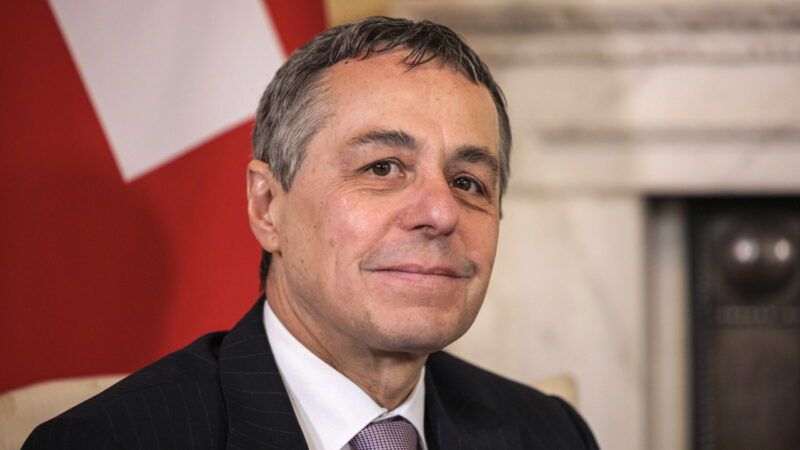Seizing Russian Assets Violates the 'Fundamental Right' to Property, Says Swiss President
"You have to ensure the citizens are protected against the power of the state. This is what we call liberal democracies."

The Russian invasion of Ukraine has dragged on for over four months, and other nations have begun to ponder how to pay for reconstruction efforts. At a two-day Ukraine recovery conference held in Switzerland that concluded yesterday, Ukrainian officials suggested that Russian assets should be seized and then sold to fund their proposed recovery plan, which comes out to $750 billion.
"We believe that the key source of recovery should be the confiscated assets of Russia and Russian oligarchs," said Ukrainian Prime Minister Denys Shmygal. "The Russian authorities unleashed this bloody war. They caused this massive destruction and they should be held accountable for it."
Switzerland served as a notable forum for that debate since the long-neutral country is a major financial hub that attracts much Russian wealth. It's estimated that Russian clients have between $155–210 billion USD in Swiss banks. Earlier in Russia's war, Swiss authorities seized some properties and froze some assets. But in remarks delivered on Tuesday, Swiss President Ignazio Cassis bristled at the Ukrainian plan to seize more Russian assets.
"The right of ownership, the right of property is a fundamental right, a human right," said Cassis. "You have to ensure the citizens are protected against the power of the state. This is what we call liberal democracies." Cassis expressed that freezing assets was still a valid response to the conflict, but emphasized that officials must "accord the most important attention on the fundamental right of individuals."
A decision that "is perfect for the situation in Ukraine," Cassis warned, may create a scenario in which "you give much more power to the states, away from the citizen."
Sanctions against Russia have very often been sanctions against Russians, heaping punishment on people who had nothing to do with their nation's brutal invasion of Ukraine. Oligarchs exist in a sort of gray zone since, the logic goes, they have direct connections to President Vladimir Putin and pressuring them effectively pressures him. Many countries have adopted that view and taken their assets accordingly, constitutional restrictions on unreasonable seizures and guarantees of due process be damned.
In March, the U.S. launched the Russian Elites, Proxies, and Oligarchs initiative, which was joined by Australia, Great Britain, Canada, France, Germany, Italy, Japan, and the European Commission. The task force had blocked or seized over $30 billion in Russian assets by late June. The House passed a bill in late April by a 417–8 margin that urged President Joe Biden to sell off oligarchs' assets to provide aid to Ukraine.
With that background, the Swiss president's remarks err on the side of individual rights at a time when many have favored broad and illiberal measures. "Restrictions on freedom are authoritarian, even if government officials try to justify them with hollow claims of being on the side of peace and liberty," writes Reason's J.D. Tuccille. "You need to rethink just what you hope to win if fighting authoritarians pushes your own society toward authoritarianism."
There is always a danger that tactics employed abroad will eventually come home. The war on terror helped spur police militarization in the U.S. as military equipment, technologies, and training reached domestic police. The PATRIOT Act, ostensibly passed to enable government surveillance of terrorists, has been routinely used at home to violate Americans' privacy and due process.
Americans pushing for Russian asset seizures now would do well to remember those downstream implications. Condemning illiberalism doesn't need to entail abandoning liberal values.


Show Comments (63)